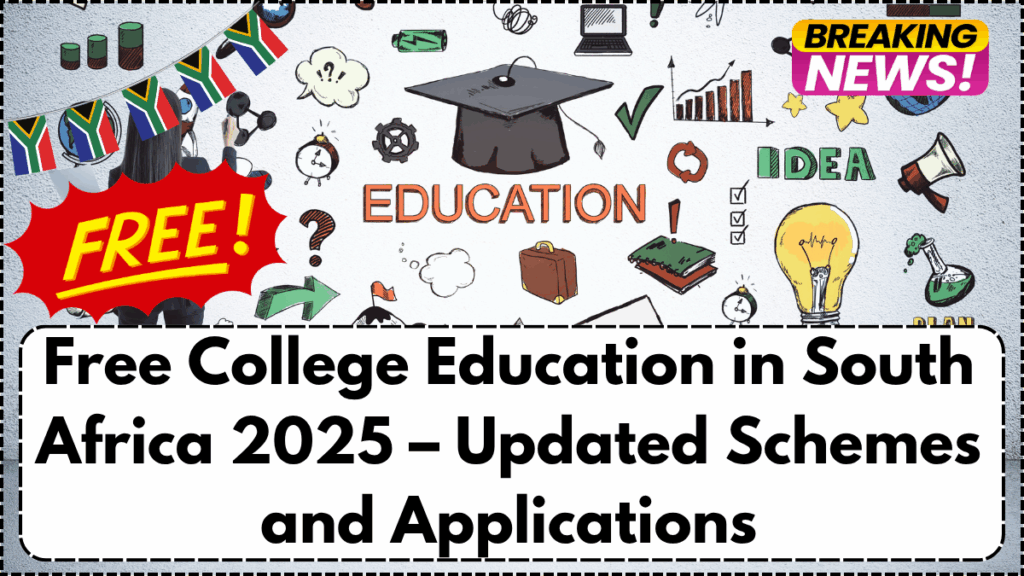As of June 2025, South Africa has expanded its commitment to providing free education for low-income students 2025, with newly updated policies, grants, and access programs aimed at making tertiary education more inclusive and accessible than ever. With several South Africa free college programs currently in place, the government and private institutions are collectively working to break down financial barriers to higher learning.

Overview of Free College Programs in South Africa – 2025 Update
The Department of Higher Education and Training (DHET) has rolled out several improvements to existing funding schemes in mid-2025. The National Student Financial Aid Scheme (NSFAS) remains the backbone of support, but newer pilot projects under provincial governments and public-private partnerships are filling the gaps that NSFAS cannot always cover. These initiatives prioritize education grants and support tailored for marginalized students.
Here is a snapshot of the top free education programs in 2025:
Program Name | Eligibility Criteria | Benefits | Application Deadline |
|---|---|---|---|
NSFAS | Household income | Tuition, books, housing, stipend | 30 November 2025 |
Ikusasa Student Financial Aid Programme (ISFAP) | Low-income & missing middle students | Tuition, academic & psychosocial support | 15 October 2025 |
Gauteng City-Region Academy (GCRA) Bursary | Gauteng-based low-income students | Full coverage, including devices | 1 December 2025 |
Funza Lushaka Bursary | Education degree students | Tuition + service year placement | 10 October 2025 |
Private Sector Tech Scholarships | Tech-focused low-income students | Tuition + internship | Rolling basis |
What’s New in South Africa Free College Programs?
The June 2025 updates brought changes to income thresholds, digital accessibility, and expanded institution coverage. A major win is the inclusion of Technical and Vocational Education and Training (TVET) colleges under most provincial support programs, recognizing their role in job creation.
Digital-first application portals have been launched, particularly targeting rural areas with mobile data subsidies and offline form submission options. NSFAS, in particular, now includes a more generous living allowance that adjusts for inflation. This shift reflects the government’s aim to make free education for low-income students 2025 not just symbolic but practical.
How to Apply for Education Grants and Free College in South Africa
To apply, students must begin by creating profiles on official portals such as myNSFAS. Required documents typically include a certified ID copy, proof of income (or affidavit), and an acceptance letter from an accredited institution. For those without internet access, local municipal offices now serve as submission points for physical applications.
Key steps in the application process:
- Register on relevant bursary portals.
- Upload required documentation.
- Complete income and academic assessments.
- Track application status via SMS or email.
Many education grants have overlapping timelines, so students are advised to apply to multiple schemes simultaneously.
Additional Support and Opportunities in 2025
Alongside tuition coverage, students benefit from mentorship, academic support services, and even mental health resources. The new 2025 framework includes pilot transportation subsidies and food allowance expansions in rural provinces.
Moreover, select South Africa free college programs now come with work-integrated learning (WIL) guarantees. This ensures that students are not only graduating debt-free but also job-ready.
TVET institutions have seen a 22% increase in enrollment compared to 2024, thanks to focused awareness campaigns and incentives targeting youth in underserved communities.
Conclusion
South Africa’s evolving landscape of free education for low-income students 2025 represents more than a policy update—it is a structural transformation aimed at equity and economic empowerment. With streamlined applications, broader coverage, and added value services, 2025 is a turning point in the fight for educational justice.
FAQs
What qualifies as a low-income student in 2025?
A low-income student is typically defined as one coming from a household earning less than R350,000 per year. Some bursaries raise the limit to R600,000 for the “missing middle.”
Can international students access these free college programs?
No, most free college and bursary programs are reserved for South African citizens or permanent residents.
Are these education grants only for first-year students?
Not necessarily. Many schemes, like NSFAS, allow continuing students to reapply annually if they maintain satisfactory academic progress.
What is the deadline for NSFAS in 2025?
Applications for NSFAS close on 30 November 2025.
Do private colleges qualify for these grants?
Most grants cover public universities and TVET colleges. However, some tech scholarships extend to registered private institutions.
Click here to learn more
